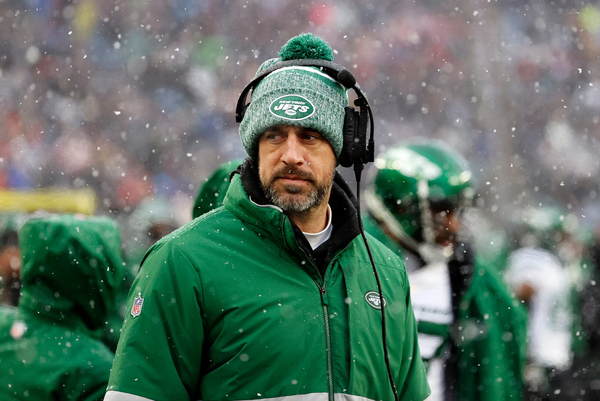

Sports talk show host Colin Cowherd has stirred the pot once again with his controversial take on NFL quarterback Aaron Rodgers. In a recent segment, Cowherd drew a bold comparison between Rodgers and NBA stars, setting him apart from fellow quarterback greats Tom Brady and Patrick Mahomes.
This take came as Cowherd was discussing Rodgers’ career and legacy. He added that although Rodgers is undoubtedly talented, his impact on the game more resembles that of an NBA superstar than it does a typical NFL quarterback legend. “Aaron’s almost an NBA brand,” Cowherd stated straightforwardly. “He wins awards. He’s aesthetically pleasing. He got very rich. But I don’t consider him an all-time great team guy, and football’s our team sport.”
“He’s very much an NBA star. He’s aesthetically pleasing, pretty to watch.”
— @ColinCowherd on what separates the all-time great quarterbacks from Aaron Rodgers pic.twitter.com/Vyxnw6i822
— Herd w/Colin Cowherd (@TheHerd) July 12, 2024
ADVERTISEMENT
Article continues below this ad
This standpoint counters the common belief about Rodgers’ place in NFL history. Cowherd referred to Rodgers’ playoff record as evidence, saying in 13 peak years, he had an 11-10 postseason record with just one Super Bowl appearance. “In 21 playoff starts, he had one come from behind win,” Cowherd emphasized. “Brady had nine times that. Mahomes is just going into his prime. He’s got five times that.”
But Cowherd’s analogy extends beyond mere numbers; it encompasses style and influence also. According to him, Rodgers is similar to many NBA superstars—someone who makes fantastic plays alone and not necessarily a player who can grind out wins late in games. “Aaron was always, as a quarterback, a frontrunner,” Cowherd said on the segment. “When the weather was good, when things were good, when he had a lead, these aren’t opinions, these are facts.”
Aaron Rodgers’ aesthetic appeal and the art of quarterbacking
The fact that this time around Cowherd takes the comparison with basketball suddenly brings into focus one often unremarked aspect of Rodgers’ game. His ability to make spectacular throws, coupled with his rapid-fire release and instinctive feel for extending plays has been described in terms of artistry.

His play has an artistic side that distinguishes him from prototypical pocket passers. His ability to improvise and throw at odd angles like some basketball wizards known for their flair on the court does form a connection with Rodgers’ distinctive characteristics. However, Cowherd argues that this aesthetic appeal hasn’t translated to the kind of team success that defines all-time greats like Brady and Mahomes.
To further illustrate his point, Cowherd compared Rodgers’ Super Bowl appearances to other NFL greats: “Brady had 10, Elway, five, Montana, four Bradshaw, four. Peyton Manning, four, Staubach, four… Aaron had one.”
ADVERTISEMENT
Article continues below this ad

So how do we define quarterback greatness? Does it hinge only on aesthetic value and individual brilliance or is there anything else one should consider? Interestingly, when the mind seeks to query whether the Packers wasted Rodgers’ prime, the common answer suggests that while Rodgers performed at an elite level throughout his career, factors such as predictable offensive schemes, defensive struggles, and the team’s draft-and-develop philosophy may have contributed to the lack of additional championships.
ADVERTISEMENT
Article continues below this ad
As Rodgers moves into the twilight of his career with the New York Jets, these questions will undoubtedly continue to fuel debate among NFL enthusiasts. The 2024 season could be crucial in shaping Rodgers’ legacy, as he attempts to prove that he can lead a new team to success and potentially silence critics like Cowherd.
In the end, as Cowherd puts it, “Aaron just didn’t win enough.” In a league where championships are the ultimate measure of success, Rodgers’ beautiful style of play may not be enough to cement his place among the all-time greats in Cowherd’s eyes.
ADVERTISEMENT
ADVERTISEMENT
ADVERTISEMENT
ADVERTISEMENT

